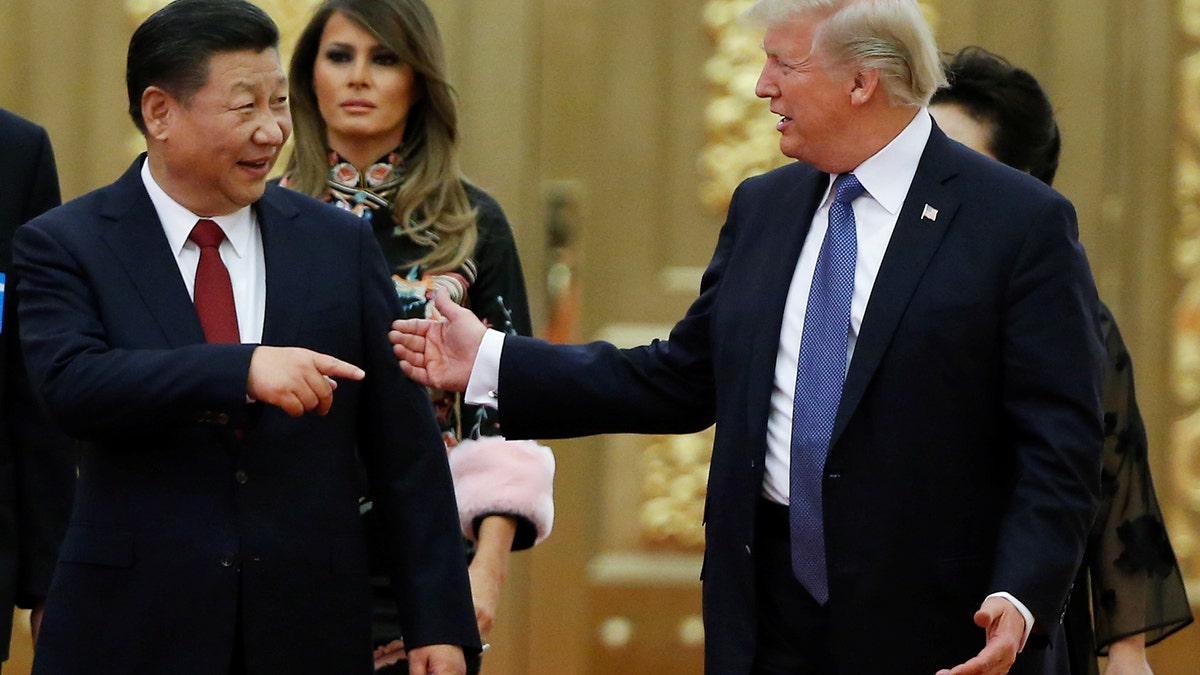
U.S. President Donald Trump and China's President Xi Jinping arrive at a state dinner at the Great Hall of the People in Beijing, China, November 9, 2017. REUTERS/Thomas Peter - RC1171507BF0 ( REUTERS/Thomas Peter)
For decades, China has waged a trade war—targeting U.S. industries and stealing jobs from ordinary American workers.
President Obama’s weakness on trade—along with the left’s obsession with identity politics—helped put Donald Trump in the White House. Now we have a leader who puts American workers first but his factious trade team appears clueless about how to bring effective pressure to win at negotiations or if necessary unilaterally reorder our trade with China to be fair.
To prevail in any international confrontation—whethr it is disarming North Korea, stifling Russian aggression or fixing trade aggression—the president needs to know the enemy, cultivate allies to bring pressure that compliments U.S. actions and implement a strategy that makes retaliation difficult.
Mr. Trump’s hawks—Ambassador Robert Lighthizer and Trade Director Peter Navarro—confuse trade with the world with trade with China. The WTO isn’t busted and our allies are not trade criminals. Europe has its dysfunctions—most significantly Germany ‘s obsession with trade surpluses that victimized southern EU members and the United States—but slapping tariffs on Europe and Canada does not solve America’s number one trade problem.
The United States has a $515 billion trade deficit—$374 billion is with China and oil accounts for most of the rest. Contrary to President Trump’s claims we have a modest trade surplus with Canada.
Our allies increasingly recognize China’s mercantilism and its goal to dominate artificial intelligence and other critical technologies by 2025 is a big threat. They could be engaged to help put pressure on China but slapping tariffs on those allies pushes them into Beijing’s corner.
In 2001, China was admitted to the WTO on the premise that its economic policies would evolve toward western norms. Instead, it got rich exploiting its developing country status on tariffs and to target and obtain critical technologies by applying coercive tactics and outright theft.
WTO rules are intended to boost trade and investment among western market economies and its dispute settlement mechanism is designed to adjudicate the venial sins of overly-aggressive, western industrial policies—for example, state subsidies to Airbus.
In 2001, China was admitted on the premise that its economic policies would evolve toward western norms. Instead, it got rich exploiting its developing country status in the WTO—that permits, for example, Chinese tariffs of 25 percent on cars as compared to the U.S. levy of 2.5 percent—and to target and obtain critical technologies by applying coercive tactics and outright theft.
Its notorious industrial targeting—opaque administrative barriers to imports that supplement high tariffs, extravagant production and export subsidies and criminal acquisition of western technology through compulsory joint ventures and outright piracy—is virtually impossible to police through WTO dispute settlement. It would be like prosecuting tens of thousands of white collar criminals on Wall Street each year—those are terribly difficult cases for government lawyers to win, even one at a time.
America and our allies need a new deal with China. If Beijing wants to rig trade, then it must be managed to bring about balance. Otherwise, China accumulates hundreds of billions of dollars it can use to buy influence through its Silk Road initiative and acquire western technology companies.
And relying on targeted tariffs is dumb.
China can quickly counter duties on $50 billion, $100 billion or even $200 billion of its exports by targeting with tariffs U.S. farmers and other industries in Republican districts vulnerable to Democratic challenges, and disrupting the operations of U.S. firms operating in China.
Instead, Mr. Trump should impose an across-the-board measure similar to the 1971 import surcharge imposed by Richard Nixon.
Specifically, limit U.S. imports from China to what we sell in China. Grant to U.S. exporters resalable quotas to import from China in proportion to sales there.
The more China buys from America, the more America buys from China. Conversely, if it penalizes U.S. agricultural products and other exports, it sells less here.
The scheme would eliminate the special pleading of U.S. businesses for exemptions from proposed tariffs on Chinese goods—those that value imports more would bid the most to purchase import licenses.
Our allies are worried about undermining the WTO and China diverting its subsidized stuff to their markets but our answer should be simple. Keep trading with China as we are and there will be no WTO worth having—Beijing will soon dictate the rules.
China’s privateers are stealing European and Canadian intellectual property and jobs too. They can join the battle by imposing a similar regime, instead of harping, whining and criticizing as they are wont to do whenever a Republican occupies the White House.
The door should be open to our allies but America should not put up with a WTO regime that puts China in charge.








































